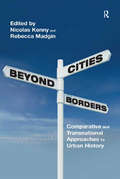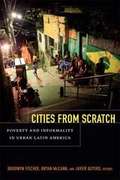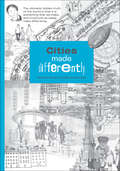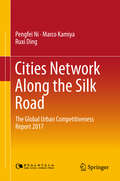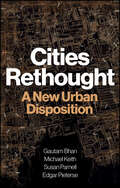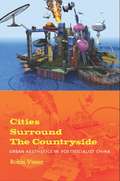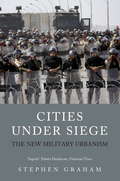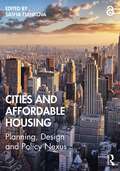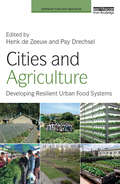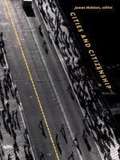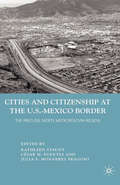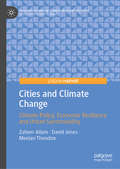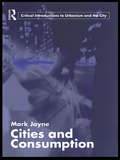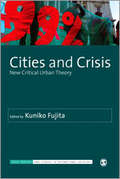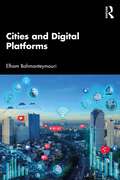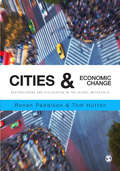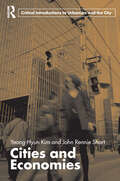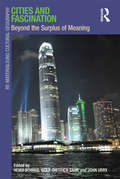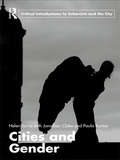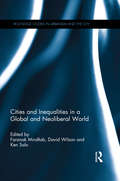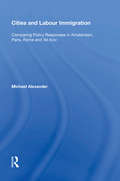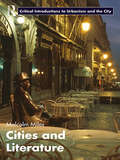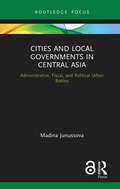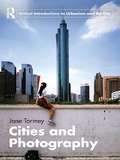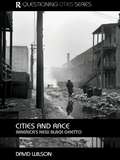- Table View
- List View
Cities Beyond Borders: Comparative and Transnational Approaches to Urban History
by Nicolas Kenny Rebecca MadginDrawing on a body of research covering primarily Europe and the Americas, but stretching also to Asia and Africa, from the mid-eighteenth century to the present, this book explores the methodological and heuristic implications of studying cities in relation to one another. Moving fluidly between comparative and transnational methods, as well as across regional and national lines, the contributors to this volume demonstrate the necessity of this broader view in assessing not just the fundamentals of urban life, the way cities are occupied and organised on a daily basis, but also the urban mindscape, the way cities are imagined and represented. In doing so the volume provides valuable insights into the advantages and limitations of using multiple cities to form historical inquiries.
Cities From Scratch: Poverty and Informality in Urban Latin America
by Javier Auyero Bryan Mccann Brodwyn FischerThis collection of essays challenges long-entrenched ideas about the history, nature, and significance of the informal neighborhoods that house the vast majority of Latin America's urban poor. Until recently, scholars have mainly viewed these settlements through the prisms of crime and drug-related violence, modernization and development theories, populist or revolutionary politics, or debates about the cultures of poverty. Yet shantytowns have proven both more durable and more multifaceted than any of these perspectives foresaw. Far from being accidental offshoots of more dynamic economic and political developments, they are now a permanent and integral part of Latin America's urban societies, critical to struggles over democratization, economic transformation, identity politics, and the drug and arms trades. Integrating historical, cultural, and social scientific methodologies, this collection brings together recent research from across Latin America, from the informal neighborhoods of Rio de Janeiro and Mexico City, Managua and Buenos Aires. Amid alarmist exposés, Cities from Scratch intervenes by considering Latin American shantytowns at a new level of interdisciplinary complexity.Contributors. Javier Auyero, Mariana Cavalcanti, Ratão Diniz, Emilio Duhau, Sujatha Fernandes, Brodwyn Fischer, Bryan McCann, Edward Murphy, Dennis Rodgers
Cities Made Differently
by David Graeber Nika DubrovskyFull of playful graphics, provocative questions, and curious facts, this book asks what makes a city and how we might make them differently.What makes a city a city? Who says? Drafted over decades out of a dialogue between artist and author Nika Dubrovsky, the late anthropologist David Graeber, and Nika&’s then four-year-old son, this delightful and provocative book Cities Made Differently opens a space for invention and collaboration. Fusing anthropology, literature, play, and drawing, the book is essentially a visual essay that asks us to reconsider our ideas about cities and the people who inhabit them. Drawing us into a world of history and myth, science and imagination, Graeber and Dubrovsky invite us to rethink the worlds we inhabit—because we can, and nothing is too strange or too wonderful to be true.With inspired pictures and prompts, Cities Made Differently asks what a city is, or could be, or once was. Sleeping at the bottom of the ocean? Buried in lava? What were those cities of long ago, and what will the cities of the future be? They might be virtual, ruled by AI, or islands of beautiful architecture afloat in seas of greenery. They might be utopian places of refuge or refugee camps as far as the eye can see. On land, underground or aloft, excavated or imagined, cities, this book tells us in provocative and funny ways, can be anything we want them to be—and what we want them to be can tell us something about who we are, what it is to be human, and what&’s possible when we make way for wonder.Cities Made Differently exists in two versions, one for reading and thinking, the other, downloadable at a4kids.org, for drawing and dreaming.
Cities Network Along the Silk Road: The Global Urban Competitiveness Report 2017
by Pengfei Ni Marco Kamiya Ruxi DingBy empirically assessing the competitiveness of 505 cities around the world from regional, national and other perspectives, this book not only ranks these cities but also presents a treasure trove of information with regard to each city's relative strengths and weaknesses. This unique resource draws on a wealth of data sources, all of which are described and assessed, and involve urban economics, geography, regional economics and many other fields. Using a concise indexing system, sophisticated methodology, and extensive figures and tables, it provides a comprehensive analysis of global urban competitiveness in 2015. Given the scope of its coverage, the book will be of great interest to readers such as local authorities, decision-makers and economic planners in cities throughout the world.
Cities Rethought: A New Urban Disposition
by Susan Parnell Gautam Bhan Michael Keith Edgar PieterseIn a world of disruptions and seemingly endless complexity, cities have become central to thinking about the future of humanity. Yet the study of cities is fragmented among different silos of expertise, diverse genres of scholarship, and widening chasms between theory and practice. How can we do better? Cities Rethought suggests that we need to remake the way we see and know cities in order to rethink how we act and intervene within them. To this end, it offers the contours of a new urban disposition. Its normative, analytical, and operational elements offer an opportunity for scholars, practitioners, and citizens alike to approach the complexity of cities anew. Written collectively for a wide audience, the text draws from cities across the global north and south, speaks across diverse genres of ideas, and reflects on the lived experience of the authors as both researchers and practitioners. It is an essential text for anyone committed to knowing their own cities as well as finding ways to meaningfully intervene in them.
Cities Surround the Countryside: Urban Aesthetics in Postsocialist China
by Robin VisserDenounced as parasitical under Chairman Mao and devalued by the norms of traditional Chinese ethics, the city now functions as a site of individual and collective identity in China. Cities envelop the countryside, not only geographically and demographically but also in terms of cultural impact. Robin Visser illuminates the cultural dynamics of three decades of radical urban development in China. Interpreting fiction, cinema, visual art, architecture, and urban design, she analyzes how the aesthetics of the urban environment have shaped the emotions and behavior of people and cultures, and how individual and collective images of and practices in the city have produced urban aesthetics. By relating the built environment to culture, Visser situates postsocialist Chinese urban aesthetics within local and global economic and intellectual trends. In the 1980s, writers, filmmakers, and artists began to probe the contradictions in China's urbanization policies and rhetoric. Powerful neorealist fiction, cinema, documentaries, paintings, photographs, performances, and installations contrasted forms of glittering urban renewal with the government's inattention to a livable urban infrastructure. Narratives and images depicting the melancholy urban subject came to illustrate ethical quandaries raised by urban life. Visser relates her analysis of this art to major transformations in urban planning under global neoliberalism, to the development of cultural studies in the Chinese academy, and to ways that specific cities, particularly Beijing and Shanghai, figure in the cultural imagination. Despite the environmental and cultural destruction caused by China's neoliberal policies, Visser argues for the emergence of a new urban self-awareness, one that offers creative resolutions for the dilemmas of urbanism through new forms of intellectual engagement in society and nascent forms of civic governance.
Cities Under Siege: The New Military Urbanism
by Stephen GrahamCities are the new battleground of our increasingly urban world. From the slums of the global South to the wealthy financial centers of the West, Cities Under Siege traces the spread of political violence through the sites, spaces, infrastructure and symbols of the world's rapidly expanding metropolitan areas.Drawing on a wealth of original research, Stephen Graham shows how Western militaries and security forces now perceive all urban terrain as a conflict zone inhabited by lurking shadow enemies. Urban inhabitants have become targets that need to be continually tracked, scanned and controlled. Graham examines the transformation of Western armies into high-tech urban counter-insurgency forces. He looks at the militarization and surveillance of international borders, the use of 'security' concerns to suppress democratic dissent, and the enacting of legislation to suspend civilian law. In doing so, he reveals how the New Military Urbanism permeates the entire fabric of urban life, from subway and transport networks hardwired with high-tech 'command and control' systems to the insidious militarization of a popular culture corrupted by the all-pervasive discourse of 'terrorism.'
Cities and Affordable Housing: Planning, Design and Policy Nexus
by Sasha TsenkovaThis book provides a comparative perspective on housing and planning policies affecting the future of cities, focusing on people- and place-based outcomes using the nexus of planning, design and policy. A rich mosaic of case studies features good practices of city-led strategies for affordable housing provision, as well as individual projects capitalising on partnerships to build mixed-income housing and revitalise neighbourhoods. Twenty chapters provide unique perspectives on diversity of approaches in eight countries and 12 cities in Europe, Canada and the USA. Combining academic rigour with knowledge from critical practice, the book uses robust empirical analysis and evidence-based case study research to illustrate the potential of affordable housing partnerships for mixed-income, socially inclusive neighbourhoods as a model to rebuild cities. Cities and Affordable Housing is an essential interdisciplinary collection on planning and design that will be of great interest to scholars, urban professionals, architects, planners and policy-makers interested in housing, urban planning and city building.
Cities and Agriculture: Developing Resilient Urban Food Systems (Earthscan Food and Agriculture)
by Pay Drechsel Henk De ZeeuwAs people increasingly migrate to urban settings and more than half of the world's population now lives in cities, it is vital to plan and provide for sustainable and resilient food systems which reflect this challenge. This volume presents experience and evidence-based "state of the art" chapters on the key dimensions of urban food challenges and types of intra- and peri-urban agriculture. The book provides urban planners, local policy makers and urban development practitioners with an overview of crucial aspects of urban food systems based on an up to date review of research results and practical experiences in both developed and developing countries. By doing so, the international team of authors provides a balanced textbook for students of the growing number of courses on sustainable agriculture, food and urban studies, as well as a solid basis for well-informed policy making, planning and implementation regarding the development of sustainable, resilient and just urban food systems.
Cities and Citizenship
by James HolstonCities and Citizenship is a prize-winning collection of essays that considers the importance of cities in the making of modern citizens. For most of the modern era the nation and not the city has been the principal domain of citizenship. This volume demonstrates, however, that cities are especially salient sites for examining the current renegotiations of citizenship, democracy, and national belonging. Just as relations between nations are changing in the current phase of global capitalism, so too are relations between nations and cities. Written by internationally prominent scholars, the essays in Cities and Citizenship propose that "place" remains fundamental to these changes and that cities are crucial places for the development of new alignments of local and global identity. Through case studies from Africa, Europe, Latin America, and North America, the volume shows how cities make manifest national and transnational realignments of citizenship and how they generate new possibilities for democratic politics that transform people as citizens. Previously published as a special issue of Public Culture that won the 1996 Best Single Issue of a Journal Award from the Professional/Scholarly Publishing Division of the Association of American Publishers, the collection showcases a photo essay by Cristiano Mascaro, as well as two new essays by James Holston and Thomas Bender. Cities and Citizenship will interest students and scholars of anthropology, geography, sociology, planning, and urban studies, as well as globalization and political science.Contributors. Arjun Appadurai, Etienne Balibar, Thomas Bender, Teresa P. R. Caldeira, Mamadou Diouf, Dilip Parameshwar Gaonkar, James Holston, Marco Jacquemet, Christopher Kamrath, Cristiano Mascaro, Saskia Sassen, Michael Watts, Michel Wieviorka
Cities and Citizenship at the U.S.-Mexico Border: The Paso del Norte Metropolitan Region
by Kathleen Staudt César M. Fuentes Julia E. Monárrez FragosoThe volume is a cutting-edge, interdisciplinary approach to analyzing an enormously significant region in ways that clarify the kind of everyday life and work that is generated in a major urban global manufacturing site amid insecurity, inequality, and a virtually absent state.
Cities and Climate Change: Climate Policy, Economic Resilience and Urban Sustainability (Palgrave Studies in Climate Resilient Societies)
by David Jones Zaheer Allam Meelan ThondooThis book explores climate change responsiveness policies for cities and discusses why they have been slow to gain traction despite having been on the international agenda for the last 30 years. The contributing role of cities in accentuating the effects of climate change is increasingly demonstrated in the literature, underscoring the unsustainable models on which urban life has been made to thrive. As these issues become increasingly apparent, there are global calls to adopt more sustainable and equitable models, however doing so will mean the disruption of economies that have historically relied upon pollution-generating industries. In order to address these issues the authors examine them from a cross-disciplinary perspective, bringing in regional, local and urban standpoints to subsequently propose an alternative short-term economic model that could accelerate the adoption of climate change mitigation infrastructures and urban sustainability in urban areas. This book will be of particular value to scholars and students alike in the field of urbanism, sustainability and resilience, as well as practitioners looking at avenues for economically incentivizing sustainable development in various geographical context.
Cities and Consumption (Routledge Critical Introductions to Urbanism and the City)
by Mark JayneIn investigating the mutual and dynamic relationship between urban development and consumption, this book asks: how are cities moulded by consumption, and how is consumption moulded by cities? Consumption stands at the intersection of different spheres of everyday life: between the public and the private, the political and the personal, the individual and the social. It is considered to be a means and motor of social change; as an active ingredient in the construction of space and place, and in constructing subjectivity and social selfhood. Providing a critical review of the ways in which urban development has been conceptualized, this book critiques urban regeneration initiatives, examines ordinary and spectacular consumption, and describes the relationship between consumption and development of the modern and post-modern city. It investigates: consumption and the city consumption and everyday life consumption, cities and identity consumption and urban regeneration. Consumption is understood to have multiple roles as a political, economic and cultural touchstone, and to be an active ingredient in the construction of place and space. Using international case studies and illustrations throughout, this book thoroughly analyzes consumption and the city, and provides a useful text for students of urban studies, sociology and geography.
Cities and Crisis: New Critical Urban Theory (SAGE Studies in International Sociology)
by Dr Kuniko FujitaRecognizing the deep relations between politics, finance, cities and citizens, this book argues for a rejuvenated account of urban theory. The book emphasises the need to understand the importance of the 2008 global financial crisis and how the crisis affects cities nested in a variety of political economies. Situating urban theory in the current economic climate, it powerfully illuminates the dynamic between history, theory, and practice. Stressing how catastrophic social and economic calamities under the crisis lead to reorganised city structures, city life and city policies and hence new urban experience, it calls for theoretical perspectives that can speak to these challenging changes. This groundbreaking title is a must for anyone interested in urban life and its rapid movements. It will be especially useful for students and researchers in urban sociology, planning, geography, urban and regional development and urban studies
Cities and Digital Platforms
by Elham BahmanteymouriCities and Digital Platforms unravels the transformative impact of digital platforms such as Airbnb and Zoom on urban landscapes, illustrating their profound influence on housing, city planning, and the broader economic fabric.Through rigorous case studies from cities such as Amsterdam, Auckland, Sydney, and Singapore, this book delves into the operational dynamics of these platforms as part of the broader “Cybernetic Capital Cycle”, a concept developed by the author to describe the nuanced interplay between digital innovations and capitalist cycles. This thorough analysis examines the dual roles of digital platforms as both disruptors and catalysts for urban transformation. It confronts the challenges of spatial inequality and probes the potential of digital solutions in fostering equitable urban development.This book is an essential read for policymakers, urban planners, and anyone intrigued by the intersection of technology, economy, and urban life, providing critical insights into the evolving dynamics of our cities in the digital age.
Cities and Economic Change: Restructuring and Dislocation in the Global Metropolis
by Ronan Paddison Tom Hutton"An invaluable text for all those interested in cities and economic change. Empirically grounded, theoretically informed, and written in a highly accessible way to help students understand processes underlying the changing urban economy, urban governance, and the role of place." - Lily Kong, National University of Singapore "Editors and contributors leave readers in no doubt about the extent of the transformations coursing through urban economies in the global north and south." - Kevin Ward, University of Manchester "An essential read for anyone interested in the role of cities in the changing global space economy." - James Faulconbridge, Lancaster University "A timely and path-breaking contribution to the urban literature. It stands out as an excellent addition to the expanding urban library and a key reference on urban issues." - George C.S. Lin, Hong Kong University Cities and Economic Change combines a sound theoretical grounding with an empirical overview of the urban economy. Specific references are made to key emergent processes and debates including splintered labour markets, informal economies, consumption, a comparative discussion of North and South, and quantitative aspects of globalization. The text is clear and accessible, with pedagogical features and illustrative case studies integrated throughout. The use of boxes for city examples, key questions for discussion at the end of main chapters together with suggested readings and key web sites are designed to aid learning and understanding.
Cities and Economies (Routledge Critical Introductions to Urbanism and the City)
by John Rennie Short Yeong-Hyun KimCities and Economies explores the complex and subtle connections between cities and economies. The rise of the merchant city, the development of the industrial city and the creation of the service-dominated urban economy are all explored, along with economic globalization and its effects on cities in both developed and developing economies. This book provides a thorough examination of the role of the city in shaping economic processes and explains the different effects that economies have on cities. It provides an invaluable and unrivaled guide to the relationship between urban structure and economic processes as they compare and contrast across the world. The authors examine the complex relationships between the city and the economy in historical and global contexts, as well as evaluating the role of world cities, the economic impacts of megacities and the role of the state in shaping urban economic policies. They focus on the ways in which cities have led, and at the same time adapted to, economic shifts. Large cities are viewed as the centres of regional and national economies, while a small number are defined by their centrality in the global economy. The book: examines key ideas and concepts on the economic aspects of urban change explores the changing nature of urban economies and their relationships with changes at the national and global levels compares current economic issues and policies of large cities around the world explores the links between globalization and economic changes in cities and the growing competitions between them. Cities and Economies uses case studies, photographs and maps expanding across the US, Western Europe and Asia. Written in a clear and accessible style, the book answers some fundamental questions about the economic role of cities. It is an essential text for students of geography, economics, sociology, urban studies and urban planning.
Cities and Fascination: Beyond the Surplus of Meaning (Re-materialising Cultural Geography Ser.)
by Wolf-Dietrich SahrBringing together leading urban scholars, this book discusses the linkages between the economic, social and psychological factors of the urban environment. It focuses on the growth of private urbanity that has led to a 'spectactularization' of the city, the most extreme component of attention being the fascination which is aroused by attractions and state-managed events. The complex characteristics of this fascination are examined under the dimensions of aesthetics, emotions, lived experiences and power structures and governance. The interdisciplinary nature of this collection has wide international appeal and will be of interest to academics of social and cultural geography and cultural and media studies.
Cities and Gender (Routledge Critical Introductions to Urbanism and the City)
by Helen Jarvis Jonathan Cloke Paula KantorMen and women experience the city differently: in relation to housing assets, use of transport, relative mobility, spheres of employment and a host of domestic and caring responsibilities. An analysis of urban and gender studies, as co-constitutive subjects, is long overdue. Cities and Gender is a systematic treatment of urban and gender studies combined. It presents both a feminist critique of mainstream urban policy and planning and a gendered reorientation of key urban social, environmental and city-regional debates. It looks behind the ‘headlines’ on issues of transport, housing, uneven development, regeneration and social exclusion, for instance, to account for the ‘hidden’ infrastructure of everyday life. The three main sections on 'Approaching the City', 'Gender and Built Environment' and, finally, 'Representation and Regulation' explore not only the changing environments, working practices and household structures evident in European and North American cities today, but also those of the global south. International case studies alert the reader to stark contrasts in gendered life-chances (differences between north and south as well as inequalities and diversity within these regions) while at the same time highlighting interdependencies which globally thread through the lives of women and men as the result of uneven development. This book introduces the reader to previously neglected dimensions of gendered critical urban analysis. It sheds light, through competing theories and alternative explanations, on recent transformations of gender roles, state and personal politics and power relations; across intersecting spheres: of home, work, the family, urban settlements and civil society. It takes a household perspective alongside close scrutiny of social networks, gender contracts, welfare regimes and local cultural milieu. In addition to providing the student with a solid conceptual grounding across broad structures of production, consumption and social reproduction, the argument cultivates an interdisciplinary awareness of, and dialogue between, the everyday issues of urban dwellers in affluent and developing world cities. The format of the book means that included with each chapter are key definitions, ‘boxed’ concepts and case study evidence along with specifically tailored learning activities and further reading. This is both a timely and trenchant discussion that has pertinence for students, scholars and researchers.
Cities and Inequalities in a Global and Neoliberal World (Routledge Studies in Urbanism and the City)
by David Wilson Faranak Miraftab Ken SaloCities continue to be key sites for the production and contestation of inequalities generated by an ongoing but troubled neoliberal project. Neoliberalism’s onslaught across the globe now shapes diverse inequalities -- poverty, segregation, racism, social exclusion, homelessness -- as city inhabitants feel the brunt of privatization, state re-organization, and punishing social policy. This book examines the relationship between persistent neoliberalism and the production and contestation of inequalities in cities across the world. Case studies of current city realities reveal a richly place-specific and generalizable neoliberal condition that further deepens the economic, social, and political relations that give rise to diverse inequalities. Diverse cases also show how people struggle against a neoliberal ethos and hence the open-endedness of futures in these cities.
Cities and Labour Immigration: Comparing Policy Responses in Amsterdam, Paris, Rome and Tel Aviv (Research In Migration And Ethnic Relations Ser.)
by Michael AlexanderUsing a unique analytical framework based on host-stranger relations, this book explores the response of cities to the arrival and settlement of labour immigrants. Comparing the local policies of four cities - Paris, Amsterdam, Rome and Tel Aviv - Michael Alexander charts the development of migrant policies over time and situates them within the broader social context. Grounded in multi-city, multi-domain empirical findings, the work provides a fuller understanding of the interaction between cities and their migrant populations. Filling a gap in existing literature on migrant policy between national-level theorizing and local-level study, the book will provide an important basis for future research in the area.
Cities and Literature (Routledge Critical Introductions to Urbanism and the City)
by Malcolm MilesThis book offers a critical introduction to the relation between cities and literature (fiction, poetry and literary criticism) from the late eighteenth to twenty-first centuries. It examines examples of writing from Europe, North America and post-colonial countries, juxtaposed with key ideas from urban cultural and critical theories. Cities and Literature shows how literature frames real and imagined constructs and experiences of cities. Arranged thematically each chapter offers a narrative which introduces a number of key thinkers and writers whose vision illuminates the prevailing idea of the city at the time. The themes are extended or challenged by boxed cases of specific texts or images accompanied by short critical commentaries; the structure provides readers with a map of the terrain enabling connections across time and place within manageable limits, and offers elements of critical discussion to serve a growing number of university courses which involve the intersections of cities and literature. This volume offers access to literature from an urban perspective for the social sciences, and access to urbanism from a literary viewpoint. It is an excellent resource for both undergraduate and postgraduate students in the fields of urban studies and English literature, planning, cultural and human geographies, architecture, cultural studies and cultural policy.
Cities and Local Governments in Central Asia: Administrative, Fiscal, and Political Urban Battles (Routledge Advances In Central Asian Studies)
by Madina JunussovaThis book presents the changing roles of urban governments and how local governments struggle to gain administrative, fiscal, and political power to combat current urban challenges in Kazakhstan. Focusing on the cities and regions selected by the national government of Kazakhstan to be the drivers of national economic development, the author analyses the impact of decentralization on the role of local governments. The book examines the practical experiences of city and regional governments with an emphasis on urban planning, public investment in national projects, and management of urban transport. Due to the complexity and irregular distribution of political reforms at different levels of local government in Kazakhstan, three separate studies are presented, each looking at a specific aspect of decentralization reform and local government function related to physical urban development and distribution of public investment. The author argues that, if the national government of Kazakhstan wants to concentrate economic resources in urban agglomerations, it is not enough to assume that local governments are ready to play the role of efficient planners and managers of urban development. A useful analysis illustrating cities and urban conglomerations as engines of growth in economic development, this book will be of interest to academics studying Central Asian Studies, in particular political and economic development, Development Studies, and Urban Studies.
Cities and Photography (Routledge Critical Introductions to Urbanism and the City)
by Jane TormeyPhotographs display attitudes, agency and vision in the way cities are documented and imagined. Cities and Photography explores the relationship between people and the city, visualized in photographs. It provides a visually focused examination of the city and urbanism for a range of different disciplines: across the social sciences and humanities, photography and fine art. This text offers different perspectives from which to view social, political and cultural ideas about the city and urbanism, through both verbal discussion and photographic representation. It provides introductions to theoretical conceptions of the city that are useful to photographers addressing urban issues, as well as discussing themes that have preoccupied photographers and informed cultural issues central to a discussion of city. This text interprets the city as a spatial network that we inhabit on different conceptual, psychological and physical levels, and gives emphasis to how people operate within, relate to, and activate the city via construction, habitation and disruption. Cities and Photography aims to demonstrate the potential of photography as a contributor to commentary and analytical frameworks: what does photography as a medium provide for a vision of ‘city’ and what can photographs tell us about cities, histories, attitudes and ideas? This introductory text is richly illustrated with case studies and over 50 photographs, summarizing complex theory and analysis with application to specific examples. Emphasis is given to international, contemporary photographic projects to provide provide focus for the discussion of theoretical conceptions of the city through the analysis of photographic interpretation and commentary. This text will be of great appeal to those interested in Photography, Urban Studies and Human Geography.
Cities and Race: America's New Black Ghetto (Questioning Cities)
by David WilsonThis fascinating book examines the 1990s rise of a new black ghetto in rust belt America, 'the global ghetto'. It uses the emergent perspective of 'racial economy' to delineate a fundamental proposition; historically neglected and marginalized black ghettos, in a 1990s era of societal boom and bust, have become more impoverished, more stigmatized, and functionally ambiguous as areas. As these ghettos grow in size and become more stigmatized entities in contemporary society, our understanding of them in relation to evolving cities and society has not kept pace. This book looks to the heart of this misunderstanding, to find out how race and political economy in cities dynamically connect in new ways ('racial economy') to deepen deprivation in these areas. This book is an essential read for students of geography, urban studies and sociology.
